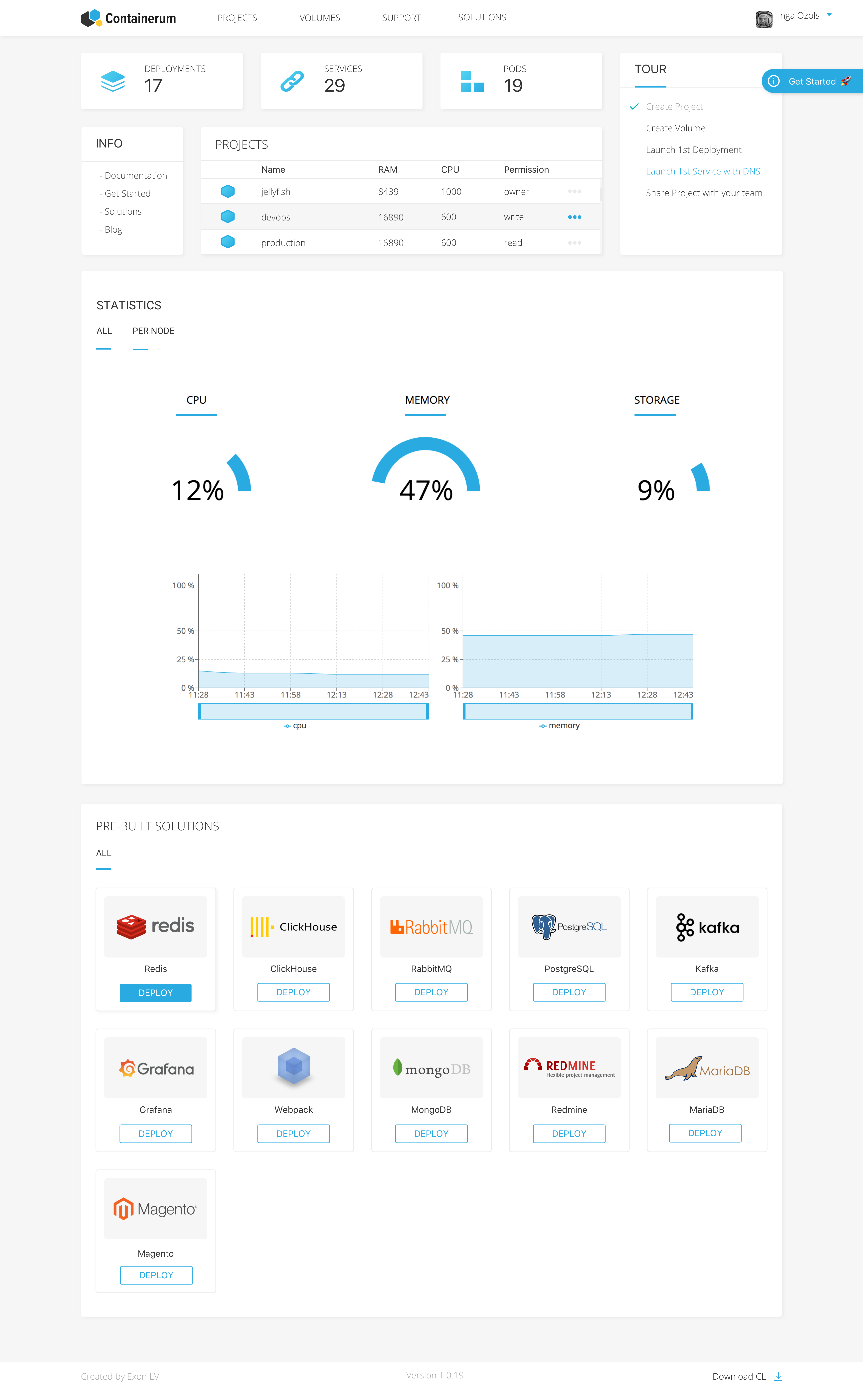containerum / Containerum
Projects that are alternatives of or similar to Containerum
Overview
Containerum is a Web UI for Kubernetes. Containerum includes tools for simple CI/CD pipelines setup and team management. Release notes are available here.
- Runs on top of any Kubernetes cluster
- Imports the resources already existing in Kubernetes clusters
Containerum UI consists of several components:
- api-gateway provides routing for Containerum components
- user-manager is a service for managing users, groups, credentials for Containerum
- resource manages Kubernetes namespace objects: deployments, ingresses, etc.
- permissions manage user access to enable teamwork
- kube-api is a set of API for communication between Containerum and K8s
- auth handles user authorization and token management
- mail is a mail server and newsletter template manager
- ui is the GUI for Containerum
- solutions is a service for launching pre-built application configurations
- volume-manager is a storage class manager
- nodeMetrics is a Prometheus-based service for monitoring the node resource utilization
- events-api is an API that formats events data from the DB and passes it to Containerum
- kube-events sources events from the Kubernetes cluster and writes them in the database
- kube-importer is a service that imports pre-existing Kubernetes objects to Containerum
- chkit is a CLI for Containerum
and 2 databases:
- MongoDB
- PostgreSQL
Basically, Containerum architecture looks like this:
Prerequisites
Before installing Containerum make sure you have the following components:
- Docker
- Kubernetes 1.9 or higher
- Helm
- Installed Kubernetes Ingress Controller
How to install
To launch Containerum on your Kubernetes Cluster without metrics collection run:
helm repo add containerum https://charts.containerum.io
helm repo update
helm install containerum/containerum
To enable collecting resource utilization metrics, install Containerum with Prometheus:
helm repo add containerum https://charts.containerum.io
helm repo update
helm install containerum/containerum —-set tags.monitoring=true
If you already have Prometheus in your cluster and want to use it to display node utilization in Containerum Web UI, install Containerum with the parameters below. Containerum is compatible with Prometheus 6.7.4 from the official Helm repository.
helm repo add containerum https://charts.containerum.io
helm repo update
helm install containerum/containerum —-set nodemetrics.env.local.PROMETHEUS_ADDR=http://{PROMETHEUS_SVC_NAME}:{PROMETHEUS_SVC_PORT}
This will install Containerum and create two Ingresses to expose it. You can view the Ingresses with kubectl get ingress.
Note 1: Containerum allows importing existing resources (deployments, services, etc.). To specify, which namespaces SHOULD NOT be imported, set the following tag during installation and list the namespaces after
CH_KUBE_IMPORTER_EXCLUDED_NS=.
--set kube-importer.env.global.CH_KUBE_IMPORTER_EXCLUDED_NS="default,kube-system"
Note 2: To create deployments in Containerum you need to have an application node. In case you use only one node, make sure it is labeled as
slave. To add the label, run:
kubectl label node ubuntu-01 role=slave
where ubuntu-01 is the name of your node.
To be able to reach Containerum Web UI and the API, add the machine IP address to /etc/hosts, e.g.:
127.0.0.1 local.containerum.io api.local.containerum.io
where 127.0.0.1 is the address of your machine with Containerum.
Now you can access Containerum Web UI at local.containerum.io.
Default username: [email protected]
Password: verystrongpassword
Getting started
Containerum has an intuitive interface. Yet we recommend starting with learning the object types in Containerum as well as the instructions on configuring Containerum in our Docs.
Don't forget to install chkit CLI (from source code or binaries - whatever you prefer!).
Roadmap
To keep track of roadmap implementation, please refer to Containerum Projects page.
-
Add events collection and notifications
-
Add custom Dashboards
-
Add integration with Jira
-
Add integration with GitLab
-
Add reporting tools
-
Add project visualization
-
Create scripts to setup CI/CD Pipelines for
- Jenkins
- TeamCity
- Bamboo
- GitLab
- Travis
- Codeship
- Add pipeline management to chkit
- Add pipeline visualization to UI
-
Add node utilisation charts to the Dashboard -
Add Solutions and Marketplace
Add Solutions- Add Marketplace
-
Add integration with Helm -
Implement ‘Project’ entity
Add Projects- Add user groups to Projects
Add users to Projects- Add role management to Projects
- Add role management to stage environments
- Add Projects to UI (CRUD)
- Add recurring checking of completed fields
- Create Events Server to track events in Projects
-
Create Stage environments
-
Implement revision control for stage environments
- Add revision history within a stage
- Add version change confirmation in production
- Add revision control
- Add automated rollbacks
- Implement rollback mechanism
- Implement update of changed files only
-
Implement revision control for Projects
-
Add admin control features
Contributing
We welcome any help from the open source community. To submit your contributions, fork the project you want to contribute to (e.g. permissions, auth, etc.), commit changes and create a pull request to the develop branch. We will review the changes and include them to the project. Read more about contributing in this document.
Issues and Support
Please submit any comments and report Containerum project bugs or issues in this repository. In case you have questions about Containerum, there are several ways you can contact our team: by filling out the form on our website or by sending us an email at [email protected].
Docs
You can find the Documentation in the Docs section on our website or in the Docs repository here on GutHub. Please, feel free to contribute to the Docs to help us make them more accurate and comprehensive.
License
Copyright (c) 2015-2019 Containerum.
Licensed under the Apache License, Version 2.0 (the "License"); you may not use this file except in compliance with the License. You may obtain a copy of the License at http://www.apache.org/licenses/LICENSE-2.0
Unless required by applicable law or agreed to in writing, software distributed under the License is distributed on an "AS IS" BASIS, WITHOUT WARRANTIES OR CONDITIONS OF ANY KIND, either express or implied. See the License for the specific language governing permissions and limitations under the License.



